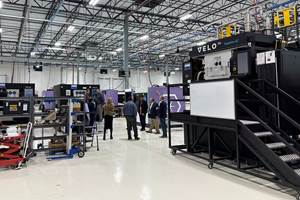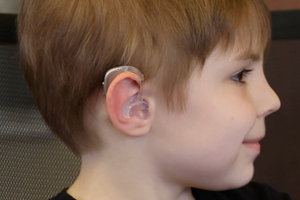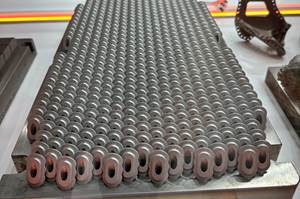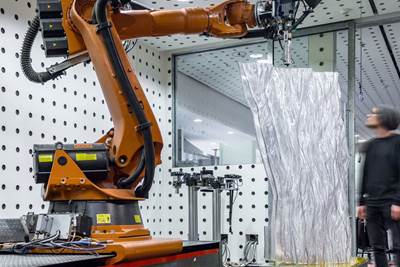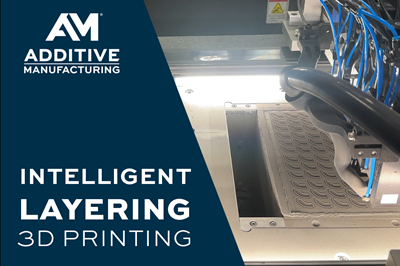Stratasys, CollPlant Unite Technologies for Industrial-Scale Bioprinting of Tissues, Organs
The joint development and commercialization agreement will initially focus on development of a bioprinting solution for CollPlant’s regenerative breast implants, addressing $2.6 billion market opportunity.
Stratasys and CollPlant Biotechnologies are collaborating on the development of a solution for bio-fabrication human tissues and organs using Stratasys’ P3 technology-based bioprinter and CollPlant’s rh-Collagen-based bioinks. The first project focuses on the development of an industrial-scale solution for CollPlant’s regenerative breast implants program.
Stratasys will provide its expertise in polymer 3D printing solutions for CollPlant, which is a regenerative and aesthetics medicine company developing technologies and products based on its plant-based collagen for tissue regeneration and organ manufacturing.
The bioprinter is based on Stratasys’ precise P3 3D printing technology in combination with CollPlant's flagship bioinks. The printer will enable the production of CollPlant’s breast implants, which are being designed to regenerate an individual’s natural breast tissue without eliciting immune response, providing a potentially revolutionary alternative for both aesthetic and reconstructive procedures.
Currently, the global breast implant market is estimated to be $2.6 billion, with breast reconstruction and augmentation procedures representing the second most common plastic surgery procedure performed worldwide. The most common breast augmentation or reconstruction procedures today are based on synthetic silicone breast implantations, which is an artificial substitution for natural regenerated tissue and has risks of complications.
As part of the collaboration, both companies have agreed to cross-promote each other’s bioprinting products. Stratasys’s bioprinter will be offered to customers together with CollPlant’s bioinks and, similarly, Stratasys’ bioprinter will be offered to CollPlant’s business partners and customers.
“Through this partnership with CollPlant, we have an important opportunity to transform health care with bioprinting to improve the lives of patients undergoing breast augmentation or reconstruction procedures,” says Stratasys CEO Dr. Yoav Zeif. “This agreement is well aligned with our strategy to deliver complete solutions for high-growth industry applications with our ecosystem of partners, and the production scale and precision 3D printing capabilities of Stratasys’ P3 Programmable Photopolymerization technology are a particularly strong fit for bioprinting applications.”
The partnership is focused on accelerating the industrialization of bioprinting for regenerative medicine. “Stratasys is leading in additive manufacturing and we are excited to collaborate ith them on this transformative initiative,” says Yehiel Tal, CollPlant CEO. “The P3 technology allows printing with high resolution and process control, and we believe that the combined, pioneering technologies of both companies will streamline the development and production process so that we have the most efficient means to produce our regenerative breast implants, and other potential tissues and organs. We believe that our rhCollagen-based regenerative implant has the potential to overcome the challenges of existing breast procedures that use silicone implants or autologous fat tissue transfer.”
In January 2023, CollPlant announced that it successfully completed a large-animal study for its 3D bioprinted regenerative breast implants. The preclinical study demonstrated progressive stages of tissue regeneration after three months, as highlighted by the formation of maturing connective tissue and neovascular networks within the implants, with no adverse events reported. Based on these positive results, CollPlant is planning to initiate a followup, large-animal study in the second half of 2023 using commercial-size implants to support subsequent human studies and future product commercialization.
- Read about the Stratasys partnership with Ricoh for print-on-demand medical models. This offering gives clinicians and patients increased access to patient-specific, 3D printed models for pre-operative surgical planning, diagnostic use and surgical education to improve clinical outcomes and drive significant savings through improved productivity.
- Learn how Stratasys’ innovation extends to moviemaking for 3D printed camera components used to capture “Avatar: The Way of Water” film. SNL Creative used AM materials from Stratasys and other providers to create stereoscopic camera rigs used by the production team during the creation of the new Avatar film. The custom-designed camera components met the rigorous requirements for filming and offered a modernized alternative for future film usage.
Related Content
Zeda AM Production Plant in Ohio Now Open — Thoughts on the New Facility
73,000-square-foot metal powder bed fusion plant includes extensive machining capability plus separate operational models for serving medical versus other businesses.
Read More3D Printing as a New Product Launchpad
With 3D printing, Minnesota manufacturer Resolution Medical offers a fast, affordable route for individuals and small to medium-sized businesses to get new medical devices and other products off the ground and into the marketplace.
Read More3D Printing Startup to Deliver Thousands of Custom Hearing Aids Over Next Five Years
Starting with a pilot program in Jordan, nonprofit 3DP4ME is developing workflows to 3D print hearing aid earmolds and prosthetics near the people who need them.
Read More8 Cool Parts From Formnext 2023: The Cool Parts Show #65
New additive manufacturing technologies on display at Formnext were in many cases producing notable end-use components. Here are some of the coolest parts we found at this year’s show.
Read MoreRead Next
GE Additive Rebrands as Colibrium Additive
As part of the brand name transition, both the Concept Laser and Arcam EBM legacy brands will be retired.
Read More3D Printing Brings Sustainability, Accessibility to Glass Manufacturing
Australian startup Maple Glass Printing has developed a process for extruding glass into artwork, lab implements and architectural elements. Along the way, the company has also found more efficient ways of recycling this material.
Read MoreVideo: Intelligent Layering Metal 3D Printing at 3DEO
Contract manufacturer 3DEO delivers metal parts using Intelligent Layering, a binder jetting-like 3D printing process the company developed and operates internally. Here’s how it works.
Read More



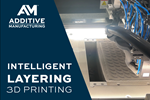
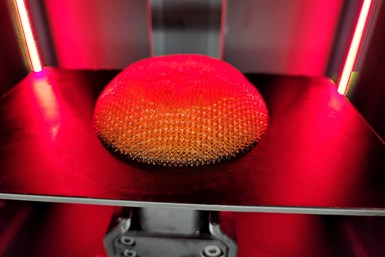



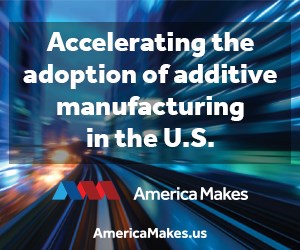


.png;maxWidth=300;quality=90)





